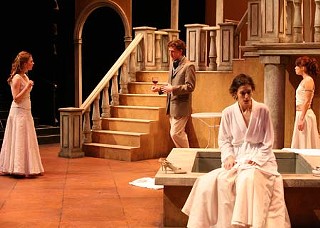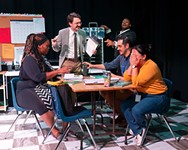Big Love
UT energetically takes on Charles Mee's update of an ancient Greek drama and makes it very here, now
Reviewed by Barry Pineo, Fri., Feb. 22, 2008
Big Love
Oscar G. Brockett Theatre, through Feb. 24
Running time: 1 hr, 30 min
Before a grand entrance constructed mostly of arches and a staircase sit a table and chair and a tub filled with water. A woman in a wedding dress enters, seemingly enraptured. She removes her dress and veil, steps into the tub, lies down, and luxuriates. A young man enters, sees her, and gently introduces himself as Giuliano. She tells him her name (Lydia), then tells him that she and her sisters were being forced to marry their cousins but didn't want to, so on their wedding day, they all got on a boat and sailed from their home in Greece to Italy.
That's the beginning of Charles L. Mee's Big Love, a "modern reconstruction," if you will, of a trilogy of plays by the Greek tragedian Aeschylus. While only one of the plays from Aeschylus' trilogy, The Suppliants, has survived to the present day, the basic story of both Mee's play and the trilogy is the same: Fifty sisters flee from one country to another, seeking asylum from forced marriage to their cousins, and while asylum initially is offered, eventually the 50 sisters are forced to comply with the marriage contract. They then band together and decide to ... well, while I'm sorely tempted to tell you the rest, I'm not going to. You can find out easily enough for yourself.
Or you can allow yourself to be surprised, in more ways than one, and see this physical, energetic staging of the play at the University of Texas' Oscar G. Brockett Theatre. Director Franchelle Stewart Dorn has managed to mine the Theatre Department's students and come up with a cast of actors nigh on perfectly cast in their roles. While they don't always hit the mark actingwise – playing emotional qualities and thus flattening out or creating a caricature rather than a character – they all get the story out clearly, and some embody their roles more than effectively. This is particularly so of Qadir Kahn, whose soft and gentle nephew, Giuliano, charms, even when wearing a cocktail dress that shows off his distinctly manly upper arms. Also bringing plenty to the story are Lesley Gurule's Lydia and Mark Scheibmeir's Nikos, who allow us to believe they fall in love in front of our eyes, and La Tasha Stephens' Bella, who expounds on the joys and travails of motherhood and serves as the voice of reason when all seems destined for loss. Tom Truss also does well in dual roles, playing both Piero, the man who takes the women in after they threaten to hang themselves in front of his house, and Leo, Piero's partying house guest.
Throughout, Dorn's actors use an emotive, physical style. The stage picture almost never stops moving, and though the movement serves to distract on occasion, for the most part it works, which makes me think Mee wrote the play to move in exactly this way. The broad, constant movement works best in two different sections of the play, where three of the sisters (we never actually see all 50 onstage at the same time – and it's a good thing, because finding a stage where they all fit would be difficult) join with three of the brothers in reciting Mee's poetic, politically charged text while moving choreographically, often in unison. Much of the play is dancelike and is, in fact, set against music – entirely appropriate for this story about love in all its aspects. Because in the end, the play is, like so many stories, another ode to that most encompassing of all human subjects: big, small; funny, sad; lost, found; living, dead; and, despite its ancient origins, very much here, now.











